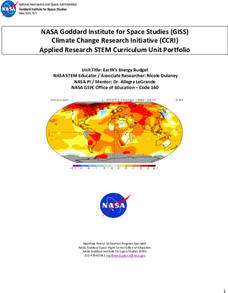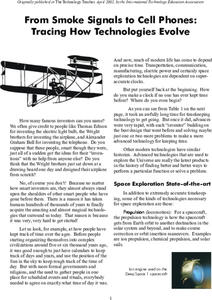Bonneville
Probes of Prior Knowledge
A bright future learning about electricity awaits. Future scientists conduct two probes to investigate electrical energy. The first requires them to think about how electricity is made, while the second has them identify appliances that...
NASA
Collecting Light: Inverse Square Law Demo
Light, distance, and mathematics come together to help scientists plan for space missions. Groups examine the relationship between distance from the sun and light availability in a hands-on exploration activity. They model the inverse...
Workforce Solutions
Newton's Laws
Two lessons explore the connection between energy transformation and a given job. In lesson one, small groups role-play a scenario that showcases the energy transformations that may take place during a job-specific task. The second...
Bonneville
Bioreactor Water Circulation System
Make those microbes warm up water. Pupils first investigate water pumps, then design a water circulation system that uses solar energy. A bioreactor in the system takes energy from compost and helps heat water.
Bonneville
Compost Bioreactor Design
Organic waste is a hot topic. The second of three installments in the Bioreactor Water Heating unit challenges pupils to create bioreactors that collect energy released from compost. After watching videos on the properties of water and...
Bonneville
Renewable Energy Panel
Plan a panel on public policy. On the first day of lessons, scholars identify local government planners and create questions to ask regarding renewable energy and infrastructure. On the second day, they conduct the panel and learn about...
Bonneville
Home Energy Audit
Reduce energy consumption and save some money at the same time! The third of seven installments in the A Community Powered by Renewable Energy unit focuses on energy use in the home. Learners investigate the energy needs of small and...
PBS
Convection: Heat Transfer | UNC-TV Science
Learn why what goes up must come down in both air and liquids. Investigators discover how convection transfers thermal energy and the movement of particles in liquids and gases due to density differences by viewing an animated video....
PBS
Thermal Energy 101: Heat Transfer | UNC-TV Science
Discover what makes a cup of tea feel hot one minute and cold the next. Young physicists learn about thermal energy, why substances feel hot or cold, and the three means of thermal energy transfer: conduction, convection, and radiation...
Smithsonian Institution
Science Starts With a Question: Energy - Teacher Guide
Get an up-close look at energy transfer. Using a three-part activity, investigators first observe a teacher-led demonstration before building a model marble track to convert potential energy to kinetic energy. Scientists explore six...
PBS
Volume and Amplitude | UNC-TV Science
Future physicists pump up the volume while discovering the world of sound waves. Group members learn about the qualities of sound waves, the relationship between energy and sound volume, and the definition of amplitude while viewing an...
PBS
House Warming
Things should heat up during a hands-on lesson exploring solar energy. An enlightening activity challenges young scientists to design a structure that collects solar energy efficiently. They keep track of temperature data over time and...
Bonneville
Home Energy Consumption
Home is where the power-consuming devices are. Scholars use given power ratings for common electrical devices to calculate the energy consumed in two hours as well as in a month. They use the average cost per kilowatt-hour to calculate...
Bonneville
Activities and Assessment of Vocabulary and Units
It's pass or fail, and one must pass to move on to the next lesson—no pressure. The second of seven installments in the Off the Grid unit has pupils demonstrate their knowledge of vocabulary as well as the process of using a multimeter....
DiscoverE
At Home: Safe Landing Activity
A parachute is probably a good idea. An engaging lesson has pupils brainstorm ways to slow the descent of a falling object to minimize the impact when it lands. They decide on a design, build a prototype, test it out, and then make...
NASA
Earth’s Energy Budget
Take the time and energy learn about Earth's energy budget. An engaging unit of four lessons focuses on the components that make up Earth's energy budget. Future scientists come up with a formula for the energy budget, then use software...
Bonneville
Variables Affecting Solar Power
Determine the best energy generator. Groups play with a photovoltaic cell to determine the variables that affect its energy output. The teams investigate a variable to determine the optimum performance of the solar cell. Pupils compare...
Bonneville
Variables Affecting Wind Turbine Power
Design the best from the best. Groups work together to come up with the best configuration of different variables that affect a wind turbine. The teams choose from several variables such as the number of blades, the angle of the blades,...
Bonneville
Three Ways to Generate Electricity
Get your hands on electricity. Pupils investigate magnetic fields and make the connection to generators in the fourth lesson plan in a series of six lessons on wind versus solar energy. Learners use a small electric motor as a generator...
Bonneville
How Much Energy Do YOU Use?
Determine the power hog in the house. Pupils learn the difference between power and energy before participating in a hands-on activity. Using a power meter, pairs measure the actual power used for several household devices, estimate the...
Bonneville
Introduction to Circuits
Light up the class's knowledge. Pupils build a simple circuit using a battery, wire, and a light bulb and create a diagram of their circuit. The teacher provides a short lecture on a complete circuit, calling attention to the direction...
Bonneville
Introduction to Energy
Transform the classroom with energy. Pupils learn about different types of energy and practice identifying the types in the first lesson of six in a solar versus wind energy unit. The class sees examples of how one type of energy can be...
NASA
From Smoke Signals to Cell Phones: Tracing How Technologies Evolve
Explore the science of space exploration. Pupils consider technological advances in propulsion, communication, power, navigation, and imaging. They select one of these areas and create a timeline of historical progress that contributed...
NASA
Moon Power - Energy and Power
Be over the moon about finding a resource on lunar power stations. An interesting unit composed of 10 lessons has pupils first learn about the energy and power needs of a futuristic lunar colony. They design and build a lunar power...

























